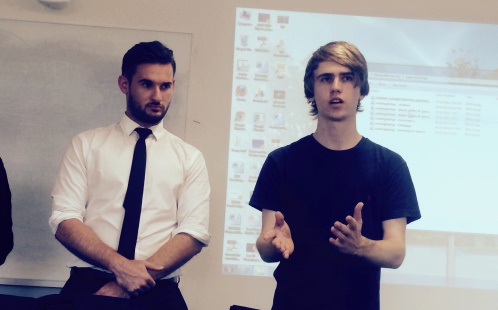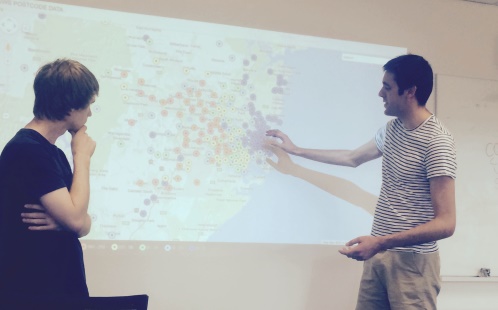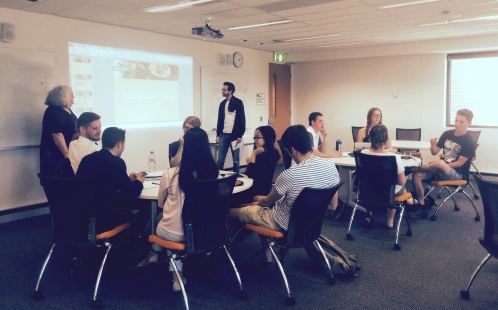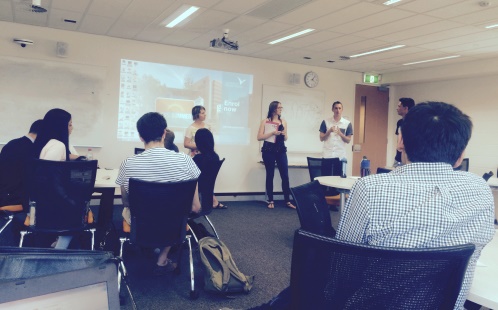Instigating creativity: Open Innovation
If you've ever lived in Western Sydney and travelled to the city for work, you know that it can be an arduous commute. Wouldn't it be great if there were more teleworking hubs available to avoid the wasted time spent travelling? This is just one of the issues a group of UWS students is working on solving as part of Open Innovation, an initiative that has developed through a partnership between UWS and Pricewaterhouse Coopers (PwC) with Google and Cisco.
Students have been given the unique opportunity to be mentored by PwC experts to assist with solving a number of problems that affect those who live and work in Western Sydney.
As well as accelerating the uptake of teleworking, other problems being tackled include healthy, affordable and sustainable diets and agriculture in the region; helping health business growth in the west; and increasing accuracy and reducing the maintenance of geospatial data.
Early in September, a selection of UWS students who expressed interest in the initiative were invited to attend a two-day event to engage with experts and business mentors to develop and present possible solutions to the four focus problems. After the event, 14 students elected to continue through to a 12-week program facilitated by PwC to further develop and refine their solution. Students who are taking part in this program are able to use the program as a 10-credit-point unit.
Jacob Muller, who is studying his Bachelor of Business and Commerce (Advanced Business Leadership), has been participating in the Open Innovation program and working on a solution to the region's teleworking issues. Jacob says there have been many highlights in his journey so far. "There are no rules except to live outside the box and to question every single one of your assumptions and relish in what you can learn from your mistakes," says Jacob. "Open Innovation is like nothing else I have experienced in my time at university."
Not surprisingly, one of the skills Jacob says he has learned is teleworking via a number of technologies to meet with his teammates. Other skills he is honing include brainstorming and team decision-making, pitching, leadership, networking, entrepreneurship and critical thinking.
Lena Nguyen, studying her Master of Business and Commerce, is working with a team to develop a mobile app that will encourage UWS students to adopt a sustainable, healthy, cheap and convenient diet. "Within such a short period of time, I have gained a lot of invaluable experience working with people in the industry who are passionate and determined to make positive changes to Greater Western Sydney," explains Lena. "The program has definitely challenged me to take more risks and to think outside the box."
Alice Warner, a Bachelor of Natural Science (Sustainable Agriculture and Food Security) student is also working to find solutions for Western Sydney families, students and workers to improve their diets. "I have learned how to conduct market research, pitch a business proposal and which questions really need answering if you want to get an enterprise off the ground," she says. "As an agriculture student, this view into the corporate world is one I would probably not otherwise have received."
Andrew Tran is studying his Bachelor of Business and Commerce (Hospitality Management) and says he has learned many skills during the program. "Skills I have learned so far are entrepreneurial skills, networking skills, communication methods, and learning how to create a good marketing pitch," he says.
Professor James Arvanitakis, who has been heavily involved in Open Innovation, says a highlight of the program has been watching students' confidence grow as they apply innovative and creative solutions to real-life challenges in an environment of rapid innovation. "We put pressure on them to decide solutions to complex problems in rapid time – it is awesome," says James.
Professor Arvanitakis says the skills the students are learning are those that will prepare them for their future careers and include adaptability, being able to learn from mistakes, new literacies such as research and data analysis, creativity, critical thinking, design thinking and communication skills.
"This is the first time we have attempted something this ambitious and it is really exciting to see it work out in this way," says James. "The students have been responsive and I believe it really has created a benchmark for promoting creativity and innovation amongst the student cohort into the future."
The 12-week Open Innovation program will finish early December.
Mobile options:





